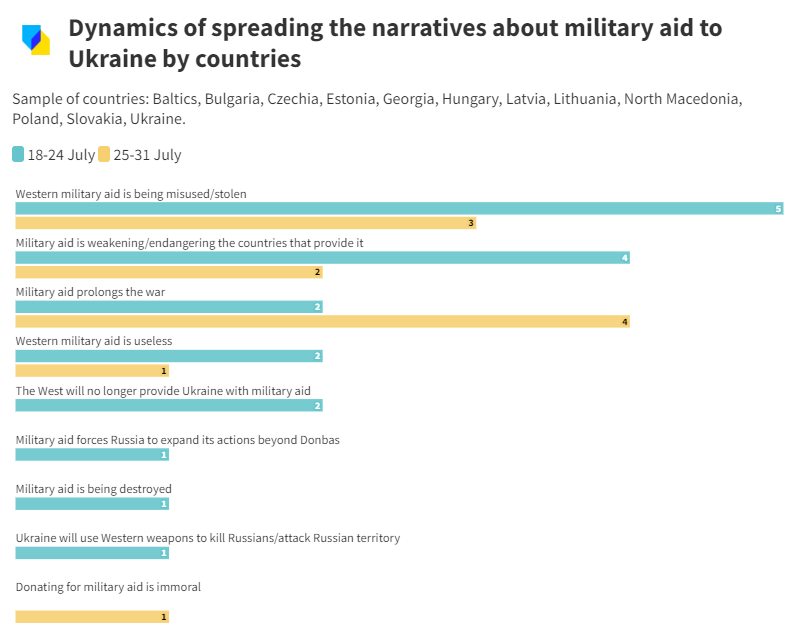Navigation and useful materials
Russian propaganda is putting significant effort into casting doubt on the necessity and expediency of supplying Ukraine with military aid.
Based on a weekly consolidated report with the findings of think tanks and research groups working continuously to monitor Russian narratives related to the war in Ukraine, Eastern and Central European countries, the Centre for Strategic Communication and Information Security investigated the media landscape of pro-Kremlin media in 12 countries from July 18 to 31 to find out what sentiments and narratives about supplies of weapons they spread in the European information field.
What narratives are spread by Russian propaganda regarding military aid to Ukraine?
The narrative “military aid from the West is misused or stolen,” which was reproduced in the most prominent cases last week (for example, the misguided story of the CBS channel), was most actively promoted in the countries of Central Europe. In particular, during the studied period, this narrative was disseminated through pro-Kremlin media in the Baltic States, Georgia, Hungary, Lithuania, Latvia, North Macedonia and Ukraine.
Alongside, the narrative “military aid to Ukraine prolongs the war” remained active and even expanded its reach. From July 18 to 24, it was found in the Czech Republic and Lithuania, but from July 25 to 31, it additionally spread to Estonia, Hungary, and Ukraine, but was no longer noted in Lithuania.
The narratives “countries that provide military aid to Ukraine are themselves becoming weaker” and “military aid from the West makes no sense” also remained.
Such messages as “Russia destroys the military aid provided to Ukraine,” “military aid forces Russia to expand military operations beyond the borders of the Donbas,” “the West will no longer supply Ukraine with military aid,” “Ukraine will use Western weapons to kill Russians or attack the territory of Russia” were active during the period from July 18 to 24. However, in the following period from July 25 to 31, they were not observed in the information space of the pro-Kremlin media in the countries of Central Europe. The narrative “Russia destroys military aid provided to Ukraine” was only spotted in Slovakia during that week.
The analysis also found a temporary decline in the dissemination of propaganda narratives regarding military aid to Ukraine in certain pro-Kremlin media among 12 countries. For example, while the researched narratives were not found only in two of the studied countries between July 18 and 24, Bulgaria and Latvia, it was six countries between July 25 and 31 — Bulgaria, the Baltic countries, Georgia and Slovakia. During this period, other topics prevailed in the named countries, such as sanctions and the course of the war in Ukraine.
How do pro-Kremlin narratives work in the countries of Central Europe?
Each of the identified narratives has the same goal — to cast doubt among the Western audience and to deprive Ukraine of military aid; however, the content of the message itself changes depending on the audience targeted with a specific message.
All narratives of the Russian propaganda concerning military aid to Ukraine that are promoted in Central European countries can be divided into two groups: some are based on psychological / ethical concerns as a means of pressure (for example, “donating to military aid is immoral), others on manipulative facts (like “the West will no longer supply military aid to Ukraine”).
Some narratives targeted only one specific country or several countries. For example, the narrative “donating to military aid is immoral” was only found in Lithuania, “Ukraine will use Western weapons to kill Russians or attack the Russian territory” in the Baltic countries, and “military aid forces Russia to expand hostilities beyond the Donbas” — in North Macedonia.
In addition, on average, 1-2 narratives per week were disseminated per country, but there were cases when more were identified at the same time. For example, Georgia had three narratives disseminated at once between July 18 and 24, and Ukraine — between July 25 and 31.
Pro-Kremlin narratives were also targeted directly at the Ukrainian audience. Ukraine was targeted with narratives undermining the credibility of the incumbent authorities and creating an image of a corrupt state (for example, “military aid from the West is misused or stolen”). There have also been messages aimed at intimidation, forming the narrative that “military aid prolongs the war” or “countries that provide military aid to Ukraine become weaker themselves.”
Countries studied: Bulgaria, the Czech Republic, Estonia, Georgia, Hungary, Latvia, Lithuania, North Macedonia, Poland, Slovakia, Ukraine
If you have found a spelling error, please, notify us by selecting that text and pressing Ctrl+Enter.



